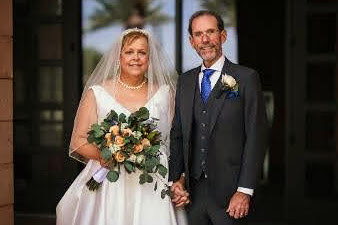
Written By: Julia Brabant
May 2023
Date of Diagnosis: August 8, 2020
Current Status: Continuing Treatment
Given 6 Months to Live in 2020, Marybeth Kirlin Continues Maintenance Therapy
When Marybeth Kirlin first learned she had pancreatic cancer, doctors told her she had about six months left to live. Now, nearly three years later, she’s long surpassed those expectations – and started seeing new doctors who saw hope in her situation.
When her pain worsened, her husband, Michael, urged Marybeth to get a second opinion. This proved harder than normal due to the onset of the COVID-19 pandemic, but they persisted, getting Marybeth in front of a new doctor.
Within a matter of days, she had an answer. Despite having no family history of cancer and no obvious symptoms aside from stomach pain, Marybeth’s doctor diagnosed her with Stage 4 pancreatic cancer.
The doctor recommended Marybeth begin a standard course of chemotherapy, believing that doing so might give her another six months. That wasn’t sitting well with Marybeth or her husband, and they began researching other pancreatic cancer care teams and treatment options.
“You don’t have to or want to be best friends with your doctor, but it does need to be someone you like and trust,” she said. “I wasn’t getting that feeling.”
Her search led her to Dr. Erkut Borazanci, MD, and Dr. Daniel Von Hoff, MD, at Scottsdale’s HonorHealth Research Institute. Within a week, she found herself in front of the pair of oncologists who thought she might be a good candidate for a clinical trial. The doctors were looking for patients to participate in their ongoing “Grand Slam” trial, which involved administering chemotherapy using Gemcitabine, Nab-paclitaxel and Cisplatin. Trial participants also had Vitamin D and immunotherapy infusions using Nivolumab.
Marybeth completed her initial chemotherapy treatment in February 2021 before beginning maintenance chemo, which involves taking lower doses of chemo drugs to help prevent the cancer from coming back. She continued receiving chemotherapy in pill form from March of 2021 through October of that same year. Now, she receives biweekly infusions as a form of maintenance therapy she’ll continue for the foreseeable future.
“Physically, I’ve soldiered through this relatively well,” Marybeth said, of her experience with chemo. “Psychologically, though, it does wear you out.”
Determined to maintain as normal a lifestyle as possible while continuing treatment, Marybeth married her longtime partner in March of 2022. Her husband, a triathlete, has been instrumental in helping her keep busy and exercise, encouraging her to swim a mile in the pool four or five times a week to help build back strength.
For Marybeth, exercise has also been a welcome distraction from medical issues. She practices yoga and takes Zumba classes in addition to her time in the pool.
“Physical activity helps you in the physical sense, but it also helps take your mind off things,” she said. “It’s hard to think about cancer when you’re busy counting swim strokes.”
Marybeth had genetic testing done to see if she carried any genetic abnormalities that may make her or her family members more susceptible to cancer. However, the tests didn’t reveal any obvious causes for concern. She also modified her diet somewhat, taking care to eat more fruits and vegetables while cutting down on sugar. She lost about 60 pounds since her diagnosis but has since gained some of it back.
“You have to learn to live a little, too,” she said, of the dietary changes she had to make after her diagnosis. “When you’re dealing with a lot of stuff emotionally, ‘living a little’ is really important, psychologically.”
Marybeth also found emotional benefits in joining support groups, particularly those specific to pancreatic cancer.
“It’s helpful to go to pancreatic cancer-specific support groups,” she said. “You get to see people who have the same thing you do, surviving and thriving, and you can talk about things you may not talk about with your doctor.”
Marybeth also expressed gratitude for Dr. B, Dr. Von Hoff, Gayle Jameson, CRNP, and the rest of the team at HonorHealth, and for Roger Magowitz and the Seena Magowitz Foundation for uniting cancer patients through support groups and special events.
“Take advantage of support resources,” she said. “They really do make the journey more bearable. They can give you the hope you need to go on another day.”
“Take it one day at a time, and expect there to be bumps in the road,” she said. “When you hit those bumps is when you learn the most about yourself.”
Marybeth is continuing maintenance chemotherapy as of April 2023.
